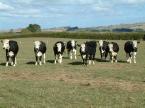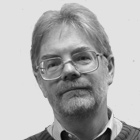 Waikato farmers who deny human-caused climate change will be cheered by the support lent by a real live scientist in an interview prominently reported in the latest issue of the Waikato Farmer, a monthly feature supplement of the Waikato Times. Admittedly not a climate scientist – a soil scientist actually – but one who has done much reading on the subject, including Nigel Lawson’s A Cool Look At Global Warming. Thus fortified he is able to substantiate the opinions of the 99 percent of the farmers consulting him who he says think global warming is a hoax and the Emissions Trading Scheme unnecessary.
Waikato farmers who deny human-caused climate change will be cheered by the support lent by a real live scientist in an interview prominently reported in the latest issue of the Waikato Farmer, a monthly feature supplement of the Waikato Times. Admittedly not a climate scientist – a soil scientist actually – but one who has done much reading on the subject, including Nigel Lawson’s A Cool Look At Global Warming. Thus fortified he is able to substantiate the opinions of the 99 percent of the farmers consulting him who he says think global warming is a hoax and the Emissions Trading Scheme unnecessary.
Doug Edmeades is his name. He’s not listed as a member of the NZ Climate Science Coalition, but his “coming out” as a sceptic was posted on their website. To be fair, in his statement on his joining the ranks of the sceptics he acknowledges that he does not read the scientific literature on climate change and cannot be considered as an authority on the subject. Indeed he says he’s a layperson who must rely on the views of others who specialise. However those whose views he then goes on to cite don’t include any climate scientists. Willem de Lange and Bob Carter are the two scientists he mentions, and they are buttressed by Bjorn Lomborg, Ross McKitrick and, yes, Christopher Monckton who demonstrated there is no scientific consensus.
Back to the Waikato Farmer interview. It’s the usual farrago. Climategate was a scandal which confirmed most farmers’ suspicions that global warming is a politically driven theory. Phil Jones has admitted there was no global warming in the past 15 years, calling into question the reliability of climate models and temperature records. Water vapour is the biggest greenhouse gas; why aren’t we taxing it? Doubled carbon dioxide will increase food production by about 30 percent. Carbon dioxide doesn’t determine global temperatures. Humans and the natural world are good at adapting to survive. Even if the alarmists are right and the average temperature increases by 2-4 degrees the likelihood is that we could be better off. And so on.
Edmeades’ expressed views are mostly wrong or reckless or silly. There’s nothing in what he says to deserve time spent countering it here. But it’s depressing that views of this nature should be regarded as worth highlighting in a farming publication and are evidently nourishing the opinion of many farmers that global warming is a matter of no great moment or still under dispute. The edition of the Waikato Farmer in which the interview appears is much concerned with the cost of the Emissions Trading Scheme to farmers. One can understand that this should be a matter of concern and debate. But to couple it with denial of the seriousness of climate change is a different matter. One of the farmers reported didn’t go as far as that, but said, “The science is not robust enough. Some of the research has been a bit shaky.” This is perception, not knowledge. It’s high time the NZ farming community discovered that the essentials of the science are established and did its thinking about the ETS or other mitigation schemes without dallying with the idea that perhaps there’s nothing in climate change to be worried about. Then people like Edmeades can be valued for their soil science and ignored for their rejection of climate science.

 Fred Pearce is a fine one to speak of a rush to judgment. Many of his Guardian articles on the UEA emails did just that. (See
Fred Pearce is a fine one to speak of a rush to judgment. Many of his Guardian articles on the UEA emails did just that. (See